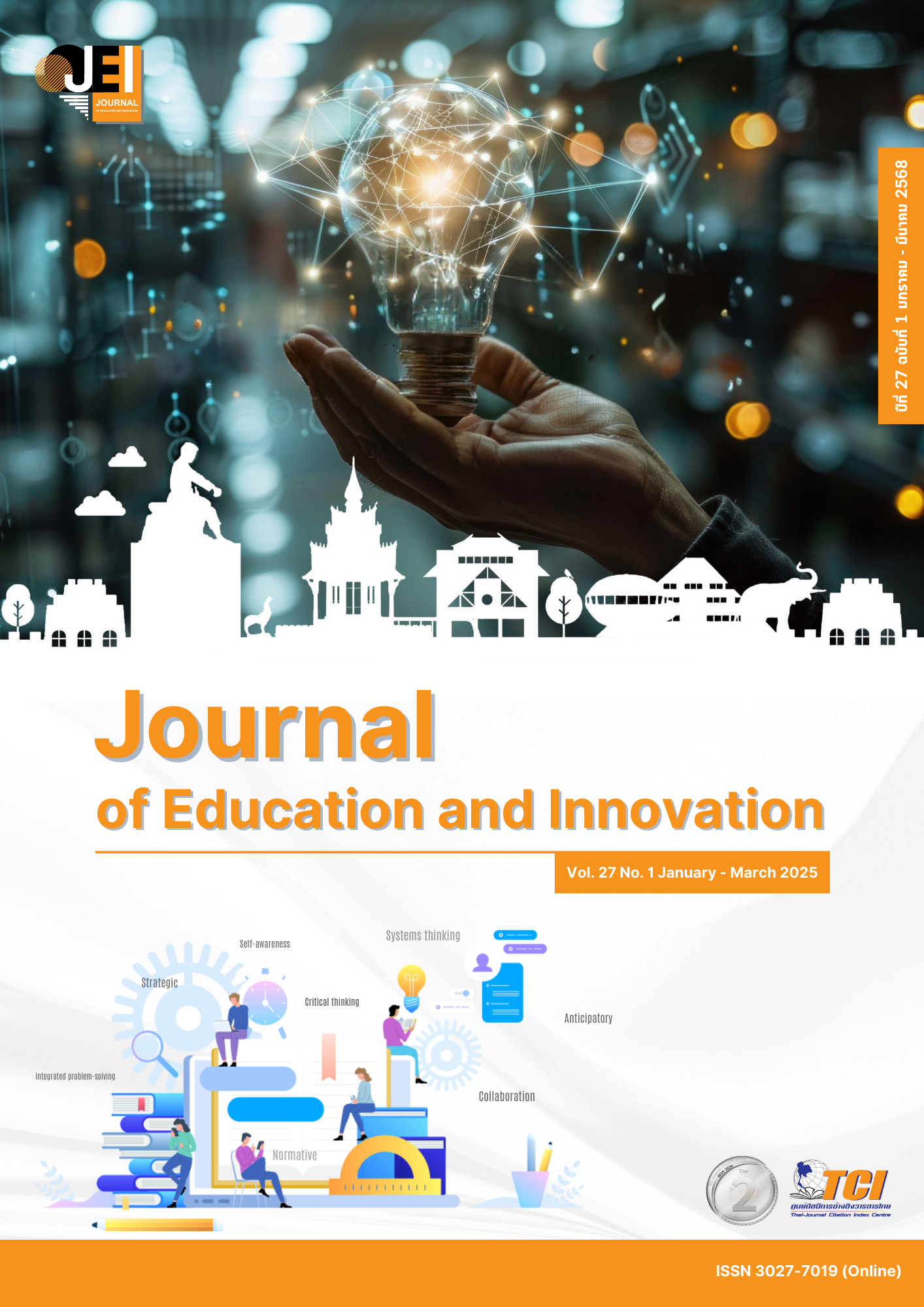DEVELOPMENT OF A TRAINING COURSE TO ENHANCE COMPETENCY-BASED INSTRUCTION FOR TEACHERS AND FOSTER STUDENTS’ PROBLEM-SOLVING ABILITIES AT SMALL PRIMARY SCHOOLS USING THE GF-TOR MODEL
Main Article Content
Abstract
Through a research and development process, this study aimed to: 1) identify key information for a training course to enhance competency-based instruction for teachers, 2) develop the course curriculum, 3) trial it, and 4) evaluate its effectiveness. The sample group for the trial comprised 44 participants, including teachers from small-sized schools under the Nakhon Ratchasima Primary Educational Service Area Office 2-4 and upper primary school students from 10 schools. The research tools included the course curriculum and manual, a competency-based instruction knowledge test, an evaluation of active learning activity design, teacher competency assessment, problem-solving skills test, and a satisfaction questionnaire. Statistical analyses involved mean, percentage, standard deviation, and t-tests. The research findings revealed significant insights: 1) The overall competency of teachers in competency-based instruction was found to be at a moderate level, with a notable proficiency in implementing it within the classroom setting. 2) The curriculum encompassed eight critical elements: background and importance, principles, aims, structural units (competency-based instruction, design and application of learning innovations, development of plans for active learning activities, and teaching practices), content (competency-based instruction and proactive activities), systematic training using change creation processes, learning media/resources, and competency-based evaluation, all expertly assessed for quality. 3) The trial results of the curriculum revealed: (1) Teachers demonstrated increased knowledge post-training, surpassing the 70% criteria with statistical significance at the .05 level. (2) Teachers exhibited a high level of ability in designing active learning activities. (3) Teachers showed high level of competency in organizing competency-based instruction. (4) Teachers expressed high level of satisfaction with the training and curriculum utilization. Subsequent testing indicated significant improvement in students’ problem-solving skills post-class, surpassing the .05 significance level, with an 80% increase exceeding the criteria. 4) The course evaluation met criteria for context, inputs, processes, and outputs, indicating high quality and suitability for further use and dissemination.
Article Details

This work is licensed under a Creative Commons Attribution-NonCommercial-NoDerivatives 4.0 International License.
The owner of the article does not copy or violate any of its copyright. If any copyright infringement occurs or prosecution, in any case, the Editorial Board is not involved in all the rights to the owner of the article to be performed.
References
Barrows, H. S., & Tamblyn, R. M. (1980). Problem-based learning: An approach to medical education. New York: Springer.
Bloom, B. S. (1968). Learning for Mastery. Evaluation Comment, 1(2), 1-12.
Boonchai, P. (2021). Development of a Model for Enhancing Learning Management Competency to Develop 21st Century Learners for Elementary School Teachers. Journal of Rangsit University: Teaching & Learning, 15(1), 118-137.
Independent Committee for Education Reform (ICER). (2019). Competency-Based Curriculum and Instruction. Retrieved April 1, 2024, from https://cbethailand.com/download/5267/
Kaiyawan, Y. (2007). Principles of research and thesis writing. Bangkok: Bangkok Supplemental Media Center.
Kerlinger, F. N., & Lee, H. B. (2000). Foundations of Behavioral Research (4th ed.). United States: Thomson Learning.
Krejcie, R. V., & Morgan, D. W. (1970). Determining sample size for research activities. Educational and Psychological Measurement, 30(3), 607-610.
Lakthong, S. (2019). The Development of a Blended Training Model Based on Self-Directed Learning Principles to Enhance Digital Literacy Competencies for Teachers in the Office of Basic Education Commission (Doctoral dissertation). Maha Sarakham: Mahasarakham University.
McClelland, D. C. (1973). Testing for competence rather than for intelligence. American Psychologist, 28(1), 12-21. DOI: 10.1037/h0034092
Meepian, C. (2020). The Development of Problem-Solving Ability Using Scenario-based Learning in Social Studies, Religion, and Culture Subject for Prathomsuksa 4 Students (Master thesis). Bangkok: Dhurakij Pundit University.
Merrill, M. D. (1991). Constructivism and Instructional Design. Educational Technology, 31(5), 45-53.
Nakhon Ratchasima Province Education Office. (2019). Small-sized primary schools in Nakhon Ratchasima Province. Retrieved January 31, 2024, from file:///C:/Users/suray/Downloads/1746-file.pdf
Office of the Basic Education Commission (OBEC). (2010). Manual of Teachers’ Competency Evaluation (Revised). Retrieved January 31, 2024, from https://www.tw-tutor.com/downloads/competency.pdf
Office of the Basic Education Commission (OBEC). (2021). Six Core Competencies. Retrieved February 5, 2024, from https://cbethailand.com/
Organization for Economic Co-operation and Development (OECD). (2023). PISA 2022 Results (Volume II): Learning During - and From - Disruption. Paris: OECD.
Stufflebeam, D. L., & Shinkfied, A. J. (1990). Systematic Evaluation. Boston: Kluwer-Nighoff.
Taba, H. (1962). Curriculum Development Theory and Practice. New York: Harcourt, Brace and World.
Tayraukham, S. (2010). Research methods for human sciences and social sciences. Maha Sarakham: Mahasarakham University Printing House.
Thailand Development Research Institute (TDRI). (2023). Small-sized school’s problems. Retrieved April 1, 2024, from https://tdri.or.th/2014/09/tdri-factsheet-28/factsheet-28-school
Thongphukdee, C., & Prongprommarat, J. (2021). Developing a model of teacher methodological competencies in 21st century for basic education institutions in Nakhon Ratchasima. NRRU Community Research Journal, 15(4), 70-84.
Tyler, R. W. (1949). Basic Principles of Curriculum and Instruction. Chicago: The university of Chicago.
Wongyai, W. (2009). Curriculum. In Encyclopedia of the Professional Teacher in Honor of His Majesty the King On the auspicious occasion of the 80th Birthday Anniversary (pp. 469-474). Bangkok: Secretariat Office of the Teachers Council of Thailand.
Wongyai, W., & Patpol, M. (2019). Coaching for Competencies. Bangkok: LCCL.


